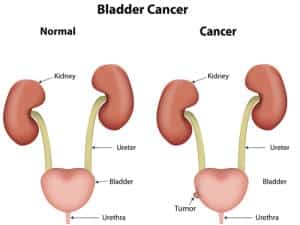Bladder Cancer in Chattanooga
 WHAT IS BLADDER CANCER?
WHAT IS BLADDER CANCER?
It is cancer that forms in the bladder. The most common type of bladder cancer is urothelial carcinoma (UC). It begins in the lining of the bladder and is the 4th most common cancer in men in the U.S. UC occurs mainly in men over the age of 55. Women are less likely to get bladder cancer. Most bladder cancer is diagnosed while confined to the inner lining of the bladder. The good news is that most bladder cancers are diagnosed early and are treatable. Other less common types include squamous cell carcinoma and adenocarcinoma and tend to be more aggressive. This article discusses UC.
Click to Call UT Urology Today to Learn More
RISK FACTORS FOR BLADDER CANCER
- Smoking causes almost 50% of bladder cancers.
- Workplace chemicals increase the risk for bladder cancer. Hairdressers, machinists, printers, painters and truck drivers are all at increased risk for bladder cancer.
- Family history increases your risk for bladder cancer.
- Cancer treatments like chemotherapy and radiation therapy to the abdomen or pelvis can increase the risk.
However, many people without any of these risk factors get bladder cancer, and many people with these risk factors do not get bladder cancer.
SIGNS AND SYMPTOMS OF BLADDER CANCER
- Blood in the urine without pain- making urine look dark red or rusty
- Feeling an urgent need to urinate even when the bladder is not full
- Frequent urination- more than you are used to
- Pain on urination
These symptoms are similar to those of other health problems including bladder infections and kidney stones. It is important to talk to your doctor so that your problem can be diagnosed and treated early.
Contact UT Urology For More Information
HOW IS BLADDER CANCER DIAGNOSED?
You will be referred to a urologist who specializes in treating bladder cancer. Your urologist will ask your medical and family health history. You will receive a physical exam, and you may have these initial tests:
- Urinalysis to see if there are cancerous or precancerous cells in the urine or tumor markers
- Cystoscopy – the urologist will use a thin, lighted tube to view your bladder
- A biopsy of bladder tissue will be taken during the cystoscopy to see if cancer is present, and the type
- X-ray imaging of the entire urinary tract using a CT Urogram provides detailed information about the tumors in the kidney, ureters, and bladder
Additional tests may be needed and could include:
- Blood work
- Chest X-ray
- IVP dye and x-rays of your bladder and urinary tract
- MRI
- Ultrasound
- Bone scans
Patient Testimonial
The care I received was prompt and thorough. They were good about calling me back and flexible when I needed to reschedule an appointment at the last minute.
GRADING AND STAGING strong>BLADDER CANCER
1) Grading the cancer: When cancer cells are found in the bladder tissue samples they will be examined under a microscope. A pathologist will grade the cells, which means he will determine the grade by how much the abnormal tissue differs from normal tissue. The higher the grade, the faster the tumor will grow and spread. The results of these tests will help your doctor to determine treatment options.
2) Staging cancer: Staging is a determination of the extent of the disease. There are 5 stages of bladder cancer:
- Stage zero is where the cancer cells are only on the inner lining of the bladder, called carcinoma in situ (CIS).
- Stage 1 is where the tumor has grown deeper into the bladder inner lining but has not invaded the bladder muscle. Most bladder cancers are stage 1.
- Stage 2 is where the tumor has invaded the bladder muscle.
- Stage 3 is where the tumor has spread through the muscles of the bladder to invade the prostate, uterus or vagina.
- Stage 4 is where the tumor has invaded the wall of the pelvis or abdomen, but not the lymph nodes. Or it has spread to the lymph nodes or other parts of the body.
MEET OUR DOCTORS
WHAT ARE THE TREATMENT OPTIONS FOR BLADDER CANCER?
Generally, the options are surgery, chemotherapy, immunotherapy or biological therapy and radiation therapy or a combination of treatments. Treatment choice depends on the stage and grade of the tumor, where it is located, whether it has spread, where it has spread and your general health and age.
- Non-muscle invasive stages A, in-situ, and 1 tumors can be removed without skin incisions by resection or laser ablation via a cystoscope. After resection of the tumors, chemotherapy or immunotherapy will be given directly into the bladder to destroy residual tumor cells at the surgical site and circulating cells, to prevent new tumors and disease recurrence. Frequent and lifelong follow-up will be necessary due to the high frequency of local recurrence and progression.
- Invasive bladder cancers (stages 2 – 4) spread when some of the cancer cells break away from the original tumor and travel through the blood vessels and the lymph nodes to the liver, lungs and bones (metastases). They require more aggressive treatments such as removal of the bladder, prostate in men, and female reproductive structures in women. A urinary diversion is usually necessary with these procedures. Combined multi-modal therapy with tumor resection, radiation and chemotherapy is also another option with less effective cancer control but may be appropriate for some people.
The urologists at UT Urology are world-class bladder cancer specialists with expertise in state-of-the-art treatments. They work with a team including radiologists and oncologists to provide you with personalized care in Tennessee and Alabama. Contact UT Urology today to discuss bladder cancer treatment in Chattanooga, Cleveland, and East Ridge, TN.
Click to Call UT Urology Today
GLOSSARY OF TERMS
- Urothelial carcinoma – cancer of the epithelium or inner lining of the urinary tract.
- Laser ablation– the process of removing/vaporizing tissue using light to generate heat which destroys the cancer cells.
- Cystoscope – a lighted instrument inserted into the urethra and up into your bladder to observe the inner lining of the urinary tract.
- Urinary diversion – a surgical procedure to reroute urine from its normal pathway.
- Metastases – the development of secondary growths distant from the primary cancer site.
BLADDER CANCER: WHAT YOU SHOULD KNOW
Every year, doctors in the United States diagnose nearly 75,000 new cases of bladder cancer. Due to lack of awareness about this condition and what symptoms could mean, many people do not receive treatment until their disease is late-stage. Like other forms of cancer, bladder cancer can spread to other parts of the body. When this happens, the disease becomes more difficult to treat. This month is bladder cancer awareness month, so we are discussing some of the basics that we want our patients to know as they navigate a lifetime of good health.
What are the factors that may increase a person’s chance of getting bladder cancer?
Interestingly, one of the leading risk factors for bladder cancer is smoking. Any kind of tobacco use, including chew, dip, and snuff, can make a person 3 times more susceptible to the disease than a non-smoker. The risk also increases when a person experiences chronic kidney stones or urinary tract infections. Finally, people whose occupation exposes them to various chemicals may be more likely to develop bladder cancer.
The link between chemicals, tobacco, and bladder cancer is that these substances get absorbed into the bloodstream. They are then filtered out through the kidneys and excreted through the urine. The presence of chemicals in the urine exposes the bladder, creating the cancer risk.
What are the most common bladder cancer symptoms?
The most common signs of bladder cancer include:
- Blood or blood clots in the urine.
- Frequent urination.
- Pain or burning sensation during urination.
- Feeling the need to urinate, but not being able to pass urine.
- Feeling the need to urinate many times throughout the night.
- Lower back pain on 1 side of the body.
These symptoms are not always caused by bladder cancer. They may occur from kidney stones, urinary tract infection, or an enlarged prostate.It is important to see a urologist for unusual symptoms to ensure a prompt and accurate diagnosis.
How is bladder cancer diagnosed?
After conducting a thorough consultation with medical history and basic exam, a urologist may order several different tests, such as:
- Urinalysis, which checks for blood in the urine.
- Urine cytology, which involves microscopic examination of urine for cancerous or precancerous cells.
- Urine culture, which places a sample of urine in a dish to observe if bacteria grows.
- Urine tumor marker tests, which screen specifically for cancer cells.
- Cytoscopy uses a thin tube with a camera to observe the bladder. This may be done with or without fluorescence to “light up” areas of cancerous tissue. A biopsy may be taken during this test if tissue looks abnormal.
How is Bladder Cancer Treated?
Bladder cancer may require a multi-pronged approach. Transurethral resection of the bladder tumor may be done in some cases. Doctors make every effort to act conservatively in the treatment of this condition so as to preserve good bladder function. Rarely is the bladder completely removed. In addition to resection surgery, patients may also need chemotherapy or radiation therapy. Ongoing treatment may also be necessary to reduce the risk of future cancerous growths.
UT Urology in Chattanooga is staffed with an exceptional team of board-certified urologists. To schedule an appointment, call (423) 778-5910.


